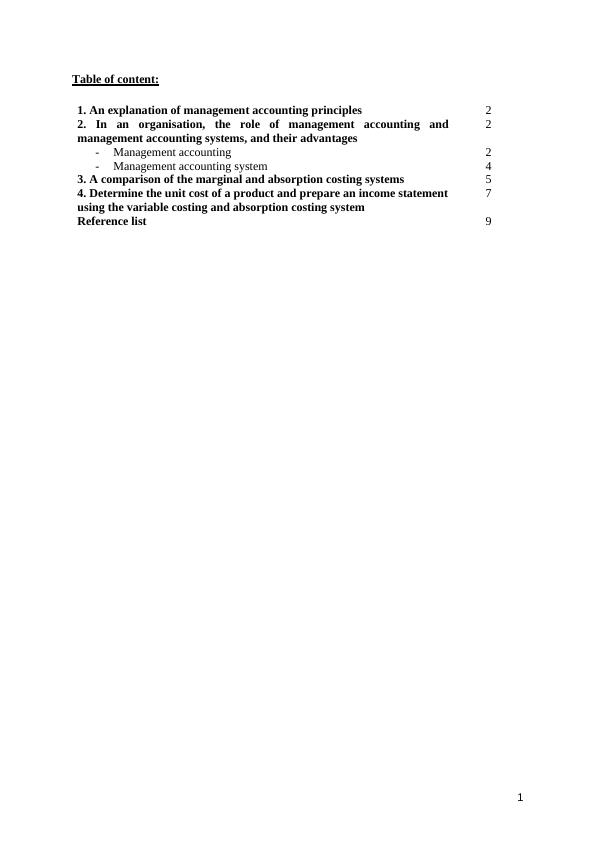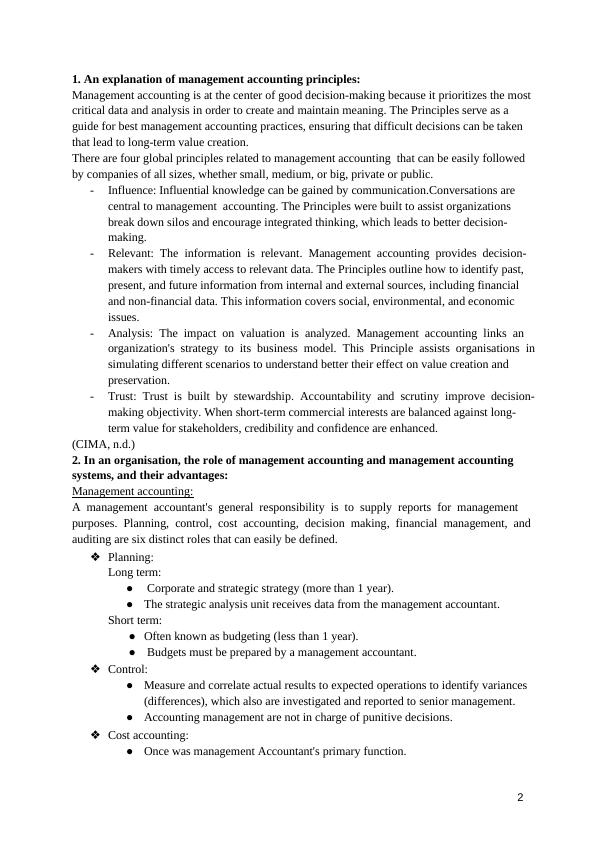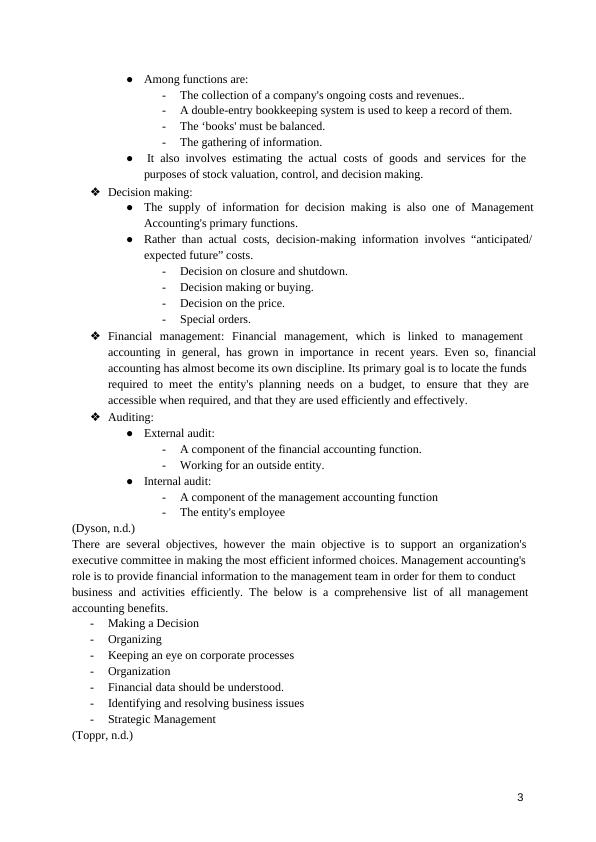Assignment on Management Accounting Principles
9 Pages2550 Words142 Views
Added on 2021-11-16
Assignment on Management Accounting Principles
Added on 2021-11-16
ShareRelated Documents
1
Table of content:
1. An explanation of management accounting principles 2
2. In an organisation, the role of management accounting and
management accounting systems, and their advantages
2
- Management accounting 2
- Management accounting system 4
3. A comparison of the marginal and absorption costing systems 5
4. Determine the unit cost of a product and prepare an income statement
using the variable costing and absorption costing system
7
Reference list 9

2
1. An explanation of management accounting principles:
Management accounting is at the center of good decision-making because it prioritizes the most
critical data and analysis in order to create and maintain meaning. The Principles serve as a
guide for best management accounting practices, ensuring that difficult decisions can be taken
that lead to long-term value creation.
There are four global principles related to management accounting that can be easily followed
by companies of all sizes, whether small, medium, or big, private or public.
- Influence: Influential knowledge can be gained by communication.Conversations are
central to management accounting. The Principles were built to assist organizations
break down silos and encourage integrated thinking, which leads to better decision-
making.
- Relevant: The information is relevant. Management accounting provides decision-
makers with timely access to relevant data. The Principles outline how to identify past,
present, and future information from internal and external sources, including financial
and non-financial data. This information covers social, environmental, and economic
issues.
- Analysis: The impact on valuation is analyzed. Management accounting links an
organization's strategy to its business model. This Principle assists organisations in
simulating different scenarios to understand better their effect on value creation and
preservation.
- Trust: Trust is built by stewardship. Accountability and scrutiny improve decision-
making objectivity. When short-term commercial interests are balanced against long-
term value for stakeholders, credibility and confidence are enhanced.
(CIMA, n.d.)
2. In an organisation, the role of management accounting and management accounting
systems, and their advantages:
Management accounting:
A management accountant's general responsibility is to supply reports for management
purposes. Planning, control, cost accounting, decision making, financial management, and
auditing are six distinct roles that can easily be defined.
❖ Planning:
Long term:
● Corporate and strategic strategy (more than 1 year).
● The strategic analysis unit receives data from the management accountant.
Short term:
● Often known as budgeting (less than 1 year).
● Budgets must be prepared by a management accountant.
❖ Control:
● Measure and correlate actual results to expected operations to identify variances
(differences), which also are investigated and reported to senior management.
● Accounting management are not in charge of punitive decisions.
❖ Cost accounting:
● Once was management Accountant's primary function.

3
● Among functions are:
- The collection of a company's ongoing costs and revenues..
- A double-entry bookkeeping system is used to keep a record of them.
- The ‘books' must be balanced.
- The gathering of information.
● It also involves estimating the actual costs of goods and services for the
purposes of stock valuation, control, and decision making.
❖ Decision making:
● The supply of information for decision making is also one of Management
Accounting's primary functions.
● Rather than actual costs, decision-making information involves “anticipated/
expected future” costs.
- Decision on closure and shutdown.
- Decision making or buying.
- Decision on the price.
- Special orders.
❖ Financial management: Financial management, which is linked to management
accounting in general, has grown in importance in recent years. Even so, financial
accounting has almost become its own discipline. Its primary goal is to locate the funds
required to meet the entity's planning needs on a budget, to ensure that they are
accessible when required, and that they are used efficiently and effectively.
❖ Auditing:
● External audit:
- A component of the financial accounting function.
- Working for an outside entity.
● Internal audit:
- A component of the management accounting function
- The entity's employee
(Dyson, n.d.)
There are several objectives, however the main objective is to support an organization's
executive committee in making the most efficient informed choices. Management accounting's
role is to provide financial information to the management team in order for them to conduct
business and activities efficiently. The below is a comprehensive list of all management
accounting benefits.
- Making a Decision
- Organizing
- Keeping an eye on corporate processes
- Organization
- Financial data should be understood.
- Identifying and resolving business issues
- Strategic Management
(Toppr, n.d.)

End of preview
Want to access all the pages? Upload your documents or become a member.
Related Documents
Management Accounting Principleslg...
|13
|1060
|234
Report on Management Accounting of Tech UKlg...
|18
|4588
|44
Management Accounting and Essential Requirements Reportlg...
|14
|4134
|32
Management Accounting and Planning Toolslg...
|13
|3643
|57
Management Accounting: Principles, Benefits, and Systemslg...
|19
|5462
|44
Management Accounting: Explanation, Methods, and Planning Toolslg...
|23
|4392
|281
